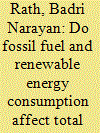|
|
|
Sort Order |
|
|
|
Items / Page
|
|
|
|
|
|
|
| Srl | Item |
| 1 |
ID:
121792


|
|
|
|
|
| Publication |
2013.
|
| Summary/Abstract |
This article analyzes the causal relationship between terrorism and economic growth, running a series of tests for Granger non-causality with panel data for a maximum of 160 countries from 1970 to 2007. The authors find that the causal relationship between terrorism and growth is heterogeneous over time and across space. They argue that the temporal causal heterogeneity can be explained by shifting geographical and ideological patterns in terrorism associated with the end of the Cold War. Different causal mechanics across countries are ascribed to a variety of country-specific factors (the level of politico-economic development, a country's cultural affiliation, the intensity and persistence of terrorist activity, and the level of political instability). These factors govern a country's robustness to shocks from terrorism and the extent to which terrorism is motivated by economic factors. For the Cold War era, economic growth is found to have swayed terrorism for Latin American countries in intermediate development positions that were politically unstable and experienced strong terrorist activity. For the post-Cold War era, terrorism is found to be detrimental to growth for African and Islamic countries with low levels of political openness, high levels of political instability, and strong terrorist activity. The study's findings help to better understand the conflicting evidence on the terrorism-economy nexus and to give more solid counter-terrorism advice.
|
|
|
|
|
|
|
|
|
|
|
|
|
|
|
|
| 2 |
ID:
128457


|
|
|
|
|
| Publication |
2014.
|
| Summary/Abstract |
This paper explores the causal relationship between clean (renewable/nuclear) and non-clean energy consumption and economic growth in emerging economies of the MIST (Mexico, Indonesia, South Korea, and Turkey) countries. The panel co-integration tests reveal that there is a long-term equilibrium relationship among GDP, capital formation, labor force, renewable/nuclear, and fossil fuel energy consumption. The panel causality results indicate that (1) there is a positive unidirectional short-run causality from fossil fuel energy consumption to economic growth with a bidirectional long-run causality; (2) there is a unidirectional long-run causality from renewable energy consumption to economic growth with positive bidirectional short-run causality, and a long-run causality from renewable to fossil fuel energy consumption with negative short-run feedback effects; and (3) there is a bidirectional long-run causality between nuclear energy consumption and economic growth and a long-run causality from fossil fuel energy consumption to nuclear energy consumption with positive short-run feedback effects. These suggest that MIST countries should be energy-dependent economies and that energy conservation policies may depress their economic development. However, developing renewable and nuclear energy is a viable solution for addressing energy security and climate change issues, and creating clean and fossil fuel energy partnerships could enhance a sustainable energy economy.
|
|
|
|
|
|
|
|
|
|
|
|
|
|
|
|
| 3 |
ID:
166297


|
|
|
|
|
| Summary/Abstract |
This study examines whether types of energy consumption affects the total factor productivity (TFP) growth. Using annual data of 1981–2013 for the panel sample of 36 countries, the results show that fossil fuel consumption declines the TFP growth, whereas, renewable energy consumption boosts the TFP growth. However, the results vary across different sub-panels. Further, the results from panel Granger causality support the feedback hypothesis in the long-run, whereas, weak evidence is found in the short-run. Since our findings supported feedback hypothesis, thus, policy should focus on reducing fossil fuel and using more renewable energy for achieving a ‘‘win-win’’ position of sustainable higher productivity growth with protective environmental quality in the long-run.
|
|
|
|
|
|
|
|
|
|
|
|
|
|
|
|
| 4 |
ID:
096745


|
|
|
|
|
| Publication |
2010.
|
| Summary/Abstract |
This paper applies recent panel methodology to investigate the long-run and causal relationship between electricity consumption and real GDP for a set of 12 European countries using annual data for the period 1970-2007. The sample countries have moved faster than other neighboring countries towards the creation of a single electricity market over the past 30 years. Energy prices are also included in the study due to their important role in affecting the above variables, thus avoiding the problem of omitted variable bias. Tests for panel unit roots, cointegration in heterogeneous panels and panel causality are employed in a trivariate VECM estimated by system GMM. The results show evidence of a long-run equilibrium relationship between the three series and a negative short-run and strong causality from electricity consumption to GDP. As expected, there is bidirectional causality between energy prices and GDP and weaker evidence between electricity consumption and energy prices. These results support the policies implemented towards the creation of a common European electricity market.
|
|
|
|
|
|
|
|
|
|
|
|
|
|
|
|
| 5 |
ID:
097600


|
|
|
|
|
| Publication |
2010.
|
| Summary/Abstract |
This paper applies recent panel methodology to investigate the long-run and causal relationship between electricity consumption and real GDP for a set of 12 European countries using annual data for the period 1970-2007. The sample countries have moved faster than other neighboring countries towards the creation of a single electricity market over the past 30 years. Energy prices are also included in the study due to their important role in affecting the above variables, thus avoiding the problem of omitted variable bias. Tests for panel unit roots, cointegration in heterogeneous panels and panel causality are employed in a trivariate VECM estimated by system GMM. The results show evidence of a long-run equilibrium relationship between the three series and a negative short-run and strong causality from electricity consumption to GDP. As expected, there is bidirectional causality between energy prices and GDP and weaker evidence between electricity consumption and energy prices. These results support the policies implemented towards the creation of a common European electricity market.
|
|
|
|
|
|
|
|
|
|
|
|
|
|
|
|
| 6 |
ID:
109700


|
|
|
|
|
| Publication |
2011.
|
| Summary/Abstract |
The purpose of this study is to determine the direction causality between nuclear energy consumption and economic growth in OECD countries. The empirical model that includes capital and labor force as the control variables is estimated for the panel of fourteen OECD countries during the period 1980-2007. Apart from the previous studies in the nuclear energy consumption and economic growth relationship, this study utilizes the novel panel causality approach, which allows both cross-sectional dependency and heterogeneity across countries. The findings show that there is no causality between nuclear energy consumption and economic growth in eleven out of fourteen cases, supporting the neutrality hypothesis. As a sensitivity analysis, we also conduct Toda-Yamamoto time series causality method and find out that the results from the panel causality analysis are slightly different than those from the time-series causality analysis. Thereby, we can conclude that the choice of statistical tools in analyzing the nature of causality between nuclear energy consumption and economic growth may play a key role for policy implications.
|
|
|
|
|
|
|
|
|
|
|
|
|
|
|
|
|
|
|
|
|